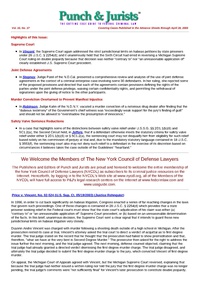Here the Court affirmed affirms as reasonable, not overly vague and not unduly restrictive, a special condition of supervised release that prohibited the defendant (who was convicted of child pornography) from owning or operating photographic equipment.
The defendant in this case pled guilty to one count of selling …
The alien-petitioner in this case sought review of an order of the United States Board of Immigration Appeals, which affirmed the denial of her motion to reopen deportation proceedings. The issue was whether notice of a deportation hearing was sufficient where the notice was sent to the immigrant's last …
In this case teams of agents from at least three different law enforcement agencies swarmed into the home of the defendant, seized numerous items from her home and arrested her on charges of possession of child pornography, after photo shop employees discovered on a roll of film a single …
This is an interesting decision in which Judge Kahn took the rare step of reversing a jury’s Federal murder conviction on the grounds that judicial intervention “was necessary to prevent manifest injustice.”
The defendant, Steven Robinson and six co-defendants, including two of his brothers, were charged with engaging in …
The principal issue before the Court in this case was whether the district court erred in holding the defendant/appellants responsible for the entire amount of loss under U.S. Sentencing Guidelines Manual § 1B1.3(a)(1)(B) (1998). The Court concluded that the district court had misapplied U.S.S.G. § 1B1.3 by failing to …
Here the Court held that safety valve relief under either USSG § 5C1.2 or § 2D1.1(b)(6) is not discretionary: if the defendant meets the specified criteria, the sentencing court must grant the relief, even if the defendant perjured himself at trial.
Customs officials at JFK Airport arrested a …
The nearly 30 defendants in this case were charged, in a series of three indictments, with over 70 substantive felony counts, relating to their alleged participation in a criminal enterprise street gang. As part of the pre-trial discovery, defense counsel received more than 20,000 pages of police reports, FBI …
The defendant in this case and a co-defendant stole a vehicle, which was later used in the robbery of an armed car and in the death of an armored guard. Although defendant was not present during the robbery and murder, and was not aware of when or where the …
Here the Court reversed a three-level enhancement of the defendant’s sentence pursuant to U.S.S.G. § 3B1.3(b) on the grounds that the district court’s finding that the defendant had acted as “more than a mere middleman" was not sufficient.
A three-level enhancement of the defendant’s sentence pursuant to U.S.S.G. …
In 1996, in order to cut back significantly on habeas litigation, Congress enacted a series of far reaching changes in the laws that govern such proceedings. One of those changes is contained in 28 U.S.C. § 2254(d) which provides that a state prisoner seeking relief in the Federal courts …
